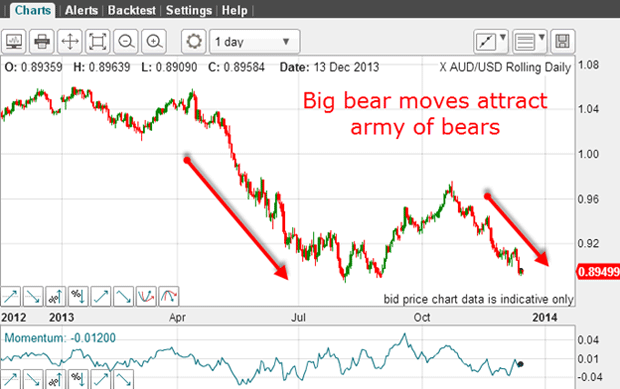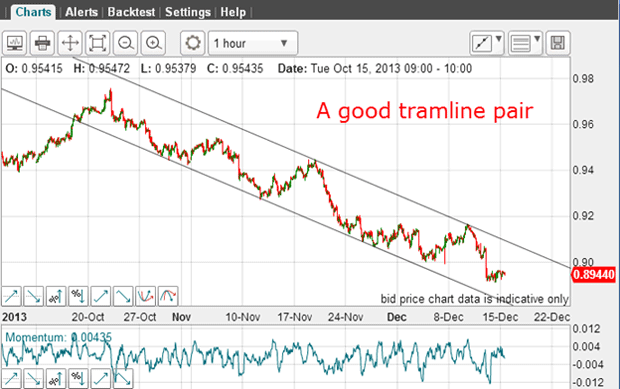My New Year’s forecast for swing traders
Ignore all the stock-market predictions for the year ahead, says John C Burford. All you need to know is right there in the charts.
Get the latest financial news, insights and expert analysis from our award-winning MoneyWeek team, to help you understand what really matters when it comes to your finances.
You are now subscribed
Your newsletter sign-up was successful
Want to add more newsletters?

Twice daily
MoneyWeek
Get the latest financial news, insights and expert analysis from our award-winning MoneyWeek team, to help you understand what really matters when it comes to your finances.

Four times a week
Look After My Bills
Sign up to our free money-saving newsletter, filled with the latest news and expert advice to help you find the best tips and deals for managing your bills. Start saving today!
It's that time of the year when many pundits emerge from the woodwork and announce what the markets will do next year. The media is full of them! They love to guess where the FTSE will end up in 12 months. They also like to promote particular equities which will shine in 2014.
But most of these pundits are employed by financial houses and have a vested interest in making such promotions. They are hardly of independent mind. Not only that, but who remembers Guru A's New Year recommendations in February, unless they have acted on it, of course?
And that is what gives the small trader an advantage: we can exercise independent judgment and do our own analysis free from the bias the gurus have.
MoneyWeek
Subscribe to MoneyWeek today and get your first six magazine issues absolutely FREE

Sign up to Money Morning
Don't miss the latest investment and personal finances news, market analysis, plus money-saving tips with our free twice-daily newsletter
Don't miss the latest investment and personal finances news, market analysis, plus money-saving tips with our free twice-daily newsletter
The other point I want to make is that it is rare for the guru's job to be on the line if they get it spectacularly wrong they have no skin in the game.
But we traders are trading our own money and cannot be wrong with impunity.
Why short-term forecasts are more accurate
As a true contrarian, I refuse to go along with this custom and inflict my views on anyone I respect your intelligence too much. In fact, I have no views on what level the markets will reach.
As a swing trader, I use market action to determine whether a long or a short trade is indicated. And market action is ever-changing and throws up surprises - sometimes when I am not expecting them. I am sure you have experienced this yourself.
Most of the time, the farthest out I can project a market move is measured in days, not months. It is akin to weather forecasting where short-term forecasts can be very accurate, while longer range ones are much more uncertain.
Reading the sentiments

The market started 2013 at the 1.06 level. But then it entered a savage bear trend that took it to under 0.89 in April, which is a loss of 16% in four months. After a basing period, the market staged a relief rally to the October high and then resumed the bear market to where it is once again challenging the 0.89 lows.
Naturally, these trending moves have attracted huge numbers of bearish speculators as they seek to ride the trend. And recently, the comments on the Aussie have become extremely bearish, as I would expect after a strong down move.
But as all trends sow the seeds of their own destruction (by attracting too many to one side of the boat and making it capsize), do we have this situation here?
This is where the COT data can shed some light:
| (Contracts of AUD 100,000) | Row 0 - Cell 1 | Row 0 - Cell 2 | Row 0 - Cell 3 | Open interest: 126,620 | ||||
| Commitments | ||||||||
| 19,134 | 64,984 | 3,021 | 87,997 | 24,318 | 110,152 | 92,323 | 16,468 | 34,297 |
| Changes from 12/03/13 (Change in open interest: 5,542) | ||||||||
| -1,063 | 476 | 1,380 | 4,483 | 1,340 | 4,800 | 3,196 | 742 | 2,346 |
| Percent of open in terest for each category of traders | ||||||||
| 15.1 | 51.3 | 2.4 | 69.5 | 19.2 | 87.0 | 72.9 | 13.0 | 27.1 |
| Number of traders in each category (Total traders: 90) | ||||||||
| 20 | 39 | 10 | 21 | 17 | 45 | 62 | Row 8 - Cell 7 | Row 8 - Cell 8 |
The hedge funds (non commercials) are overwhelmingly bearish (as I expected), by a whopping ratio of almost three and a half to one. Similarly, the small traders (non-reportables) are about two-to-one bearish. This is an extreme bearish position.
The commercials, considered the smart money, are overwhelmingly bullish by a factor of almost four to one.
The question is: who would be brave enough to bet against the smart money? Because that is what a bear would be doing now. This puts a different light on the market, doesn't it? Many traders would gaze at the bear market and decide it safe to join the trend after all, the trend is your friend, is it not?
I would say that this puts the market in a position of being vulnerable to a short squeeze. And that could lift the Aussie back up by a wide margin.
Emotional trading rarely works out
But how to trade this setup? Here is the hourly chart:

I have an excellent lower tramline with many accurate touch points. Therefore, one way to trade it is to wait for a possible upward break of the upper tramline.
But one method I do not recommend is to jump in when you feel like it that is emotional trading which rarely works out well. And acting on the gurus' projections for 2014 falls into that category.
Get the latest financial news, insights and expert analysis from our award-winning MoneyWeek team, to help you understand what really matters when it comes to your finances.
John is is a British-born lapsed PhD physicist, who previously worked for Nasa on the Mars exploration team. He is a former commodity trading advisor with the US Commodities Futures Trading Commission, and worked in a boutique futures house in California in the 1980s.
He was a partner in one of the first futures newsletter advisory services, based in Washington DC, specialising in pork bellies and currencies. John is primarily a chart-reading trader, having cut his trading teeth in the days before PCs.
As well as his work in the financial world, he has launched, run and sold several 'real' businesses producing 'real' products.
-
 Should you buy an active ETF?
Should you buy an active ETF?ETFs are often mischaracterised as passive products, but they can be a convenient way to add active management to your portfolio
-
 Power up your pension before 5 April – easy ways to save before the tax year end
Power up your pension before 5 April – easy ways to save before the tax year endWith the end of the tax year looming, pension savers currently have a window to review and maximise what’s going into their retirement funds – we look at how